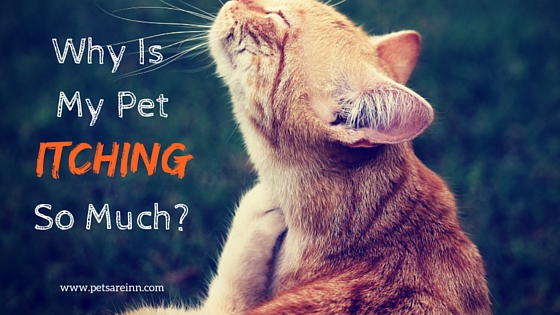10 Reasons Your Dog or Cat Is Itching
Why do you scratch? Because you itch. Why do dogs or cats scratch? For the same reason.
So what causes your pet's itching, licking, scratching or rubbing? It can be a mystery at times. Skin conditions with very different causes can look alike. For example, dogs or cats suffering from flea allergies, food allergies or environmental allergies may display similar signs of skin problems. The treatments, however, are very different.
A veterinarian can determine the source of the infection in order to determine the most effective treatment. For example, an antifungal ointment won’t work on a bacterial infection or ear mites.
If you’re wondering what’s causing your Fido or Fluffy to itch like mad, it may be one of these most common culprits:
1. Bacterial Infections
The #1 cause of skin infection is a bacterial infection (pyoderma). Because bacterial infections can look like other skin conditions, it’s important to partner with your veterinarian to determine if the cause is indeed a bacterium, and, more specifically, which one. Not all antibiotics are effective against all bacteria.
2. Flea Allergies
 Flea allergy dermatitis (FAD) is the most common allergy in dogs; it’s less common in cats. It occurs in pets who are allergic or hypersensitive to the saliva fleas emit when they bite. The itch response is so great that a pet will often lick, scratch or chew skin to the point that it becomes infected. You may not even see a flea because your pet is grooming so intensely.
Flea allergy dermatitis (FAD) is the most common allergy in dogs; it’s less common in cats. It occurs in pets who are allergic or hypersensitive to the saliva fleas emit when they bite. The itch response is so great that a pet will often lick, scratch or chew skin to the point that it becomes infected. You may not even see a flea because your pet is grooming so intensely.3. Food Allergies
Dogs and cats can have food allergies just like people, but their reactions may be different. Some pets may get rashes, hives or swelling. Other pets may respond by chewing, scratching or rubbing, causing secondary infections from bacteria, yeast or fungus. A veterinarian can help manage your pet’s immediate discomfort and design a special diet program to identify the source of your pet’s food allergy.
4. Environmental Allergies
Environmental allergies, also called atopic dermatitis, are non-food- or non-flea-related allergies. Culprits include dust, pollen, grass, mold, tobacco and mildew. Did you know that cats can be allergic to our hair, too? Interestingly, pets with these allergies often show the irritation by scratching excessively, chewing, rubbing or licking.
5. Fungal Infections
Fungal infections can occur anywhere in the body, including the skin. They often look like bacterial or yeast infections, so consult with your veterinarian for the correct diagnosis. Identifying fungus early is important because antibiotics that work on bacterial infections are not effective against fungi. Also, some fungi, such as ringworm, are contagious.
6. Yeast Infections
Yeast are a normal inhabitant of the skin and ears in low numbers. Occasionally, they can overgrow and cause infection. Yeast infections are also common where there is skin-to-skin contact, such as in skin folds or armpits.
7. Ear Mites
Ear mites are tiny, eight-legged parasites. They feed on wax and oils in the ear canal—Yuck!—causing irritation and inflammation. If untreated, ear mites can infect the external and internal canal, resulting in more serious skin or ear infections. Treatment is important to preserve hearing function and prevent infection.
8. Mange (Scabies)
Sarcoptic mange (scabies) causes intensely itchy skin in dogs and cats. It results from sarcoptic mites invading the skin. Common signs of sarcoptic mange are red spots, intense itching and hair loss. These mites can move from pet to pet and from pets to people, so early and aggressive treatment is critical.
9. Ticks or Lice
While ticks do not always cause itching, they often can, especially when lodged in or around the ears. Although they are less common than ticks, lice also cause itching. They typically make their home in matted coats of fur.
10. Endocrine Diseases
Your pet’s endocrine system (including hormones) is a collection of glands that generates hormones and delivers them to organs and systems throughout the body. When your cat or dog’s endocrine system malfunctions, it may generate a hormone level that is too high or too low. Consequently, a wide range of serious conditions can develop, including skin problems. The most common hormonal imbalances that can affect the skin are thyroid and cortisone.
Source: Vet Street




Comments
Post a Comment